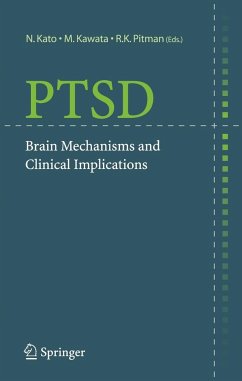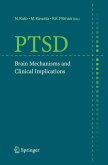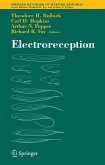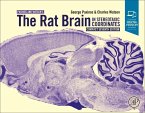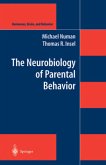Nobumasa Kato / Mitsuhiro Kawata / Roger K. Pitman (eds.)Brain Mechanisms and Clinical Implications
Ptsd
Brain Mechanisms and Clinical Implications
Herausgegeben:Kato, N.; Kawata, M.; Pitman, R.K.
Nobumasa Kato / Mitsuhiro Kawata / Roger K. Pitman (eds.)Brain Mechanisms and Clinical Implications
Ptsd
Brain Mechanisms and Clinical Implications
Herausgegeben:Kato, N.; Kawata, M.; Pitman, R.K.
- Gebundenes Buch
- Merkliste
- Auf die Merkliste
- Bewerten Bewerten
- Teilen
- Produkt teilen
- Produkterinnerung
- Produkterinnerung
Recent catastrophic events, such as the attack on the New York World Trade Center and the devastating tsunami in the Indian Ocean, have drawn increasing attention to post-traumatic stress disorder, or PTSD. Once thought of only in psychological terms, PTSD has emerged as the model mental disorder for studying the effect of the environment on human biological systems, especially the brain. This book breaks new ground by offering neuroscientific insights into PTSD and their implications for diagnosis, prevention, and treatment. The recent explosion of biological investigation into this…mehr
Andere Kunden interessierten sich auch für
![PTSD PTSD]() PTSD112,99 €
PTSD112,99 €![Electroreception Electroreception]() Electroreception112,99 €
Electroreception112,99 €![The Rat Brain in Stereotaxic Coordinates: Compact The Rat Brain in Stereotaxic Coordinates: Compact]() George PaxinosThe Rat Brain in Stereotaxic Coordinates: Compact120,99 €
George PaxinosThe Rat Brain in Stereotaxic Coordinates: Compact120,99 €![Primates of Western Uganda Primates of Western Uganda]() Nicholas E. Newton-Fisher / Hugh Notman / James D. Paterson / Vernon Reynolds (eds.)Primates of Western Uganda294,99 €
Nicholas E. Newton-Fisher / Hugh Notman / James D. Paterson / Vernon Reynolds (eds.)Primates of Western Uganda294,99 €![The Neurobiology of Parental Behavior The Neurobiology of Parental Behavior]() Michael NumanThe Neurobiology of Parental Behavior223,99 €
Michael NumanThe Neurobiology of Parental Behavior223,99 €![Supernavigators Supernavigators]() David BarrieSupernavigators21,99 €
David BarrieSupernavigators21,99 €![Plant Mites and Sociality Plant Mites and Sociality]() Yutaka SaitoPlant Mites and Sociality134,99 €
Yutaka SaitoPlant Mites and Sociality134,99 €-
-
-
Recent catastrophic events, such as the attack on the New York World Trade Center and the devastating tsunami in the Indian Ocean, have drawn increasing attention to post-traumatic stress disorder, or PTSD. Once thought of only in psychological terms, PTSD has emerged as the model mental disorder for studying the effect of the environment on human biological systems, especially the brain. This book breaks new ground by offering neuroscientific insights into PTSD and their implications for diagnosis, prevention, and treatment. The recent explosion of biological investigation into this distressing and disabling condition has been led by this volume's authors, who range from skilled basic scientists to experienced diagnosticians and therapists. Their contributions epitomize state-of-the-art, translational research in clinical neuroscience, and will prove to be an invaluable source of reference for practitioners and researchers in this field.
Hinweis: Dieser Artikel kann nur an eine deutsche Lieferadresse ausgeliefert werden.
Hinweis: Dieser Artikel kann nur an eine deutsche Lieferadresse ausgeliefert werden.
Produktdetails
- Produktdetails
- Verlag: Springer / Springer Japan / Springer, Berlin
- Artikelnr. des Verlages: 11572190, 978-4-431-29566-2
- 2006 edition
- Seitenzahl: 304
- Erscheinungstermin: 1. Februar 2006
- Englisch
- Abmessung: 234mm x 156mm x 19mm
- Gewicht: 640g
- ISBN-13: 9784431295662
- ISBN-10: 4431295666
- Artikelnr.: 15172010
- Herstellerkennzeichnung
- Libri GmbH
- Europaallee 1
- 36244 Bad Hersfeld
- gpsr@libri.de
- Verlag: Springer / Springer Japan / Springer, Berlin
- Artikelnr. des Verlages: 11572190, 978-4-431-29566-2
- 2006 edition
- Seitenzahl: 304
- Erscheinungstermin: 1. Februar 2006
- Englisch
- Abmessung: 234mm x 156mm x 19mm
- Gewicht: 640g
- ISBN-13: 9784431295662
- ISBN-10: 4431295666
- Artikelnr.: 15172010
- Herstellerkennzeichnung
- Libri GmbH
- Europaallee 1
- 36244 Bad Hersfeld
- gpsr@libri.de
Nobumasa Kato, University of Tokyo, Japan / Mitsuhiro Kawata, Kyoto Prefectual University of Medicine, Kyoto, Japan / Roger K. Pitman, Harvard Medical School, Boston, MA, USA
Part I Basic Mechanism of PTSD and Stress-Related Brain Dysfunctions Neuroanatomical and Molecular Changes in Stress Responses During Early Life: Implications for Stress Disorders Toru Nishikawa, Akeo Kurumaji, Takashi Ito, Asami Umino, and Sumikazu Ishii Cortisol and PTSD: Animal Experiments and Clinical Perspectives E. Ronald de Kloet and Melly S. Oitzl Stress and Corticosteroid Receptors Mitsuhiro Kawata, Mayumi Nishi, Ken-ichi Matsuda, Hirotaka Sakamoto, Cui Honghai, and Takanori Yoshii Stress Vulnerability Induced by Neonatal Isolation and the Disturbance Between the Phosphorylation and Dephosphorylation of CREB Shigeru Morinobu, Seiichi Tsuji, Michihiro Takahashi, David S Russell, Jun Takahashi, Kazuhide Tanaka, Koichiro Fujimaki, Shigeto Yamawaki, Sachiko Endoh, and Masao Endoh Neuroscience of Emotional Memory and Posttraumatic Stress Disorder Shigenobu Kanba, Koutaro Kudo, Naoko Kaneko, Henny Wati, Hironobu Iguchi, and Keiko Takemoto Studies on Pathophysiology of PTSD Using the SPS Model Kazuhisa Kohda, Kunio Kato, and Nobumasa Kato Mechanisms of Lasting Change in Anxiety Induced by Severe Stress Robert Adamec, Jacqueline Blundell, K. Strasser, and Paul Burton Altered Emotional Behaviors in Mammalian Bombesin Receptor Knockout Mice: Implication for the Molecular Pathogenesis of Stress-Induced Psychiatric Disorders in Humans Keiji Wada, Kazuyuki Yamada, Yuko Santo-Yamada, Hiroshi Maeno, Etsuko Wada, and Masayuki Sekiguchi Role of Stress Hormones and the Amygdala in Creating Lasting Memories James L. McGaugh, Benno Roozendaal, and Shoki Okuda Drug Discovery for PTSD: Characterization of an Animal Model of PTSD and PET Imaging of Brain Glucocorticoid Receptor Katsuya Harada, Takahiro Matsuya, Takayuki Yamaji, Yoshihiro Murakami, Akihiko Noda, Hiroyuki Takamatsu, Kazuhiko Osoda, Nobuya Matsuoka, and Shintaro Nishimura Tissue Metabolism of Glucocorticoids: New Controls of Cognitive Function and the Stress Response Jonathan R Seckl Maternal Deprivation in Neonatal Period and Biological Rhythms Ken-ichi Honma, Ayano Yamazaki, Yoshio Ootsuki, Natsumi Noda, and Sato Honma Part II Clinical Implications for PTSD and Perspectives in Psychiatry Current Perspectives on Clinical Studies of PTSD in Japan Yoshiharu Kim Psychosocial and Genetic Susceptibility to Posttraumatic Stress Disorder Min-Soo Lee and Heon-Jeong Lee Intrusion in Women with Breast Cancer Yutaka Matsuoka, Mitsue Nagamine, and Yosuke Uchitomi Earthquake-Related PTSD: A Follow-Up Study in Prevalence, Comorbidity, Quality of Life, and Biological Correlates Tung-Ping Su, Frank Huang-Chih Chou, Wen-Chen Ou-Yang, and Pesus Chou Psychological Consequences for Students Who Survived the Ehime Maru Accident: A 26-Month Follow-Up Study Masaharu Maeda, Takayuki Maruoka, and Hisao Maeda Structural and Functional Neuroimaging in Posttraumatic Stress Disorder Kiyoto Kasai, Hidenori Yamasue, Tsuyoshi Araki, Hideshi Sakamoto, and Nobumasa Kato Functional Neuroimaging Research in Posttraumatic Stress Disorder Israel Liberzon and Brian Martis Functional Abnormality of the Prefrontal Cortex in Posttraumatic Stress Disorder: Psychophysiology and Treatment Studies Assessed by Near-Infrared Spectroscopy Toshiyuki Ohtani and Koji Matsuo Neural Correlates of Symptom Improvement in Posttraumatic Stress Disorder: Positron Emission Tomography Study Hiromasa Tokunaga, Yoshitaka Ikejiri, Hiroaki Kazui, Yoshihiro Masaki, Naoki Hatta, Talant Doronbekov, Masamichi Honda, Naohiko Oku, Jun Hatazawa, Takashi Nishikawa, and Masatoshi Takeda Cognitive Behavior Therapy: Implications from Advances in Neuroscience Richard A. Bryant Pharmacological Interventions for Posttraumatic Stress Disorder Murray B. Stein Secondary Pharmacological Prevention of PTSD: Therapeutic Implications of a Translational Model Roger K. Pitman
Part I Basic Mechanism of PTSD and Stress-Related Brain Dysfunctions Neuroanatomical and Molecular Changes in Stress Responses During Early Life: Implications for Stress Disorders Toru Nishikawa, Akeo Kurumaji, Takashi Ito, Asami Umino, and Sumikazu Ishii Cortisol and PTSD: Animal Experiments and Clinical Perspectives E. Ronald de Kloet and Melly S. Oitzl Stress and Corticosteroid Receptors Mitsuhiro Kawata, Mayumi Nishi, Ken-ichi Matsuda, Hirotaka Sakamoto, Cui Honghai, and Takanori Yoshii Stress Vulnerability Induced by Neonatal Isolation and the Disturbance Between the Phosphorylation and Dephosphorylation of CREB Shigeru Morinobu, Seiichi Tsuji, Michihiro Takahashi, David S Russell, Jun Takahashi, Kazuhide Tanaka, Koichiro Fujimaki, Shigeto Yamawaki, Sachiko Endoh, and Masao Endoh Neuroscience of Emotional Memory and Posttraumatic Stress Disorder Shigenobu Kanba, Koutaro Kudo, Naoko Kaneko, Henny Wati, Hironobu Iguchi, and Keiko Takemoto Studies on Pathophysiology of PTSD Using the SPS Model Kazuhisa Kohda, Kunio Kato, and Nobumasa Kato Mechanisms of Lasting Change in Anxiety Induced by Severe Stress Robert Adamec, Jacqueline Blundell, K. Strasser, and Paul Burton Altered Emotional Behaviors in Mammalian Bombesin Receptor Knockout Mice: Implication for the Molecular Pathogenesis of Stress-Induced Psychiatric Disorders in Humans Keiji Wada, Kazuyuki Yamada, Yuko Santo-Yamada, Hiroshi Maeno, Etsuko Wada, and Masayuki Sekiguchi Role of Stress Hormones and the Amygdala in Creating Lasting Memories James L. McGaugh, Benno Roozendaal, and Shoki Okuda Drug Discovery for PTSD: Characterization of an Animal Model of PTSD and PET Imaging of Brain Glucocorticoid Receptor Katsuya Harada, Takahiro Matsuya, Takayuki Yamaji, Yoshihiro Murakami, Akihiko Noda, Hiroyuki Takamatsu, Kazuhiko Osoda, Nobuya Matsuoka, and Shintaro Nishimura Tissue Metabolism of Glucocorticoids: New Controls of Cognitive Function and the Stress Response Jonathan R Seckl Maternal Deprivation in Neonatal Period and Biological Rhythms Ken-ichi Honma, Ayano Yamazaki, Yoshio Ootsuki, Natsumi Noda, and Sato Honma Part II Clinical Implications for PTSD and Perspectives in Psychiatry Current Perspectives on Clinical Studies of PTSD in Japan Yoshiharu Kim Psychosocial and Genetic Susceptibility to Posttraumatic Stress Disorder Min-Soo Lee and Heon-Jeong Lee Intrusion in Women with Breast Cancer Yutaka Matsuoka, Mitsue Nagamine, and Yosuke Uchitomi Earthquake-Related PTSD: A Follow-Up Study in Prevalence, Comorbidity, Quality of Life, and Biological Correlates Tung-Ping Su, Frank Huang-Chih Chou, Wen-Chen Ou-Yang, and Pesus Chou Psychological Consequences for Students Who Survived the Ehime Maru Accident: A 26-Month Follow-Up Study Masaharu Maeda, Takayuki Maruoka, and Hisao Maeda Structural and Functional Neuroimaging in Posttraumatic Stress Disorder Kiyoto Kasai, Hidenori Yamasue, Tsuyoshi Araki, Hideshi Sakamoto, and Nobumasa Kato Functional Neuroimaging Research in Posttraumatic Stress Disorder Israel Liberzon and Brian Martis Functional Abnormality of the Prefrontal Cortex in Posttraumatic Stress Disorder: Psychophysiology and Treatment Studies Assessed by Near-Infrared Spectroscopy Toshiyuki Ohtani and Koji Matsuo Neural Correlates of Symptom Improvement in Posttraumatic Stress Disorder: Positron Emission Tomography Study Hiromasa Tokunaga, Yoshitaka Ikejiri, Hiroaki Kazui, Yoshihiro Masaki, Naoki Hatta, Talant Doronbekov, Masamichi Honda, Naohiko Oku, Jun Hatazawa, Takashi Nishikawa, and Masatoshi Takeda Cognitive Behavior Therapy: Implications from Advances in Neuroscience Richard A. Bryant Pharmacological Interventions for Posttraumatic Stress Disorder Murray B. Stein Secondary Pharmacological Prevention of PTSD: Therapeutic Implications of a Translational Model Roger K. Pitman

